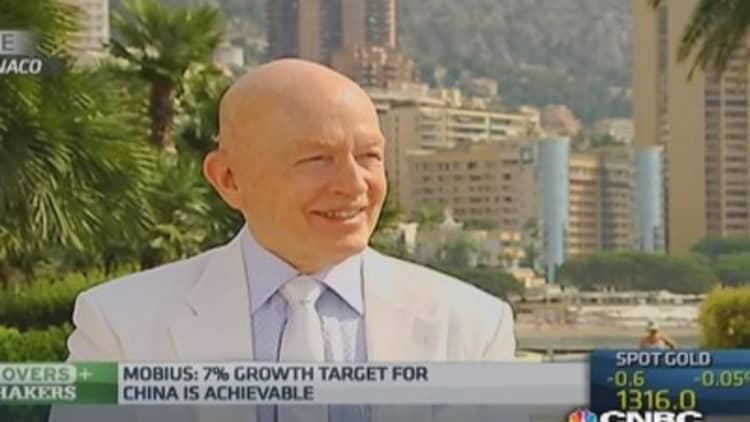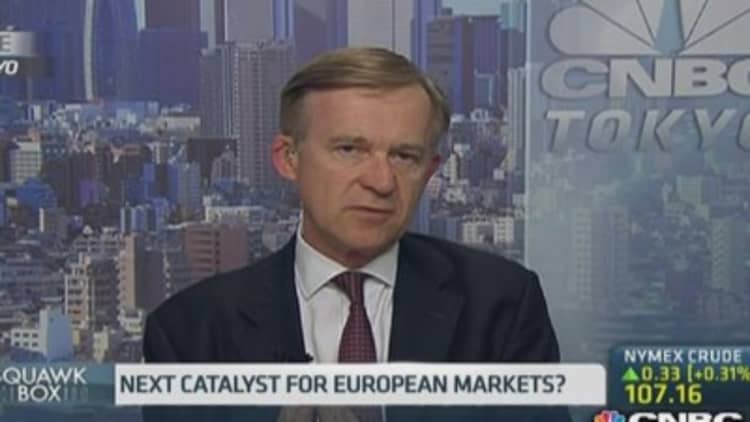
Veteran investor Mark Mobius told CNBC there were "lots of opportunities" in Russia, despite the continuing tensions surrounding Ukraine.
Both the Russian ruble and MICEX stock index plummeted at the height of the Ukraine crisis in March, but have recovered some ground over recent weeks.
Mobius, who is executive chairman of Templeton Emerging Markets Group, stressed that despite these gains, Russia remained a good location for investment.
"The Russian ruble is down against the U.S. dollar, so U.S. dollar investors have a good opportunity," he said. "And the market has not done that well. There has been a little bit of a spurt, but there's lots of opportunities there."
Read MoreTop mutual fund managers push developing markets
Over the year to date, the dollar is up 4.28 percent against the Russian rouble. Over the same period, the Micex stock index is trading 1.36 percent lower.
It comes as a number of firms have turned bullish on Russia over recent days, with JPMorgan raising its recommendation on Russian equities from "underweight" to "overweight" last week.
On Iraq, meanwhile, where violence continues, Mobius said it was important to look at the country's separate regions independently.
"It's true that Iraq has a problem, but if you look at the Kurdistan areas you'll see a lot of good things happening there," he said. "Drilling for oil is one of the most important things they're doing, and pumping that oil to Turkey and others parts of the world."
Read MoreAre emerging markets giving off bad vibes?
He added: "You have to look again, even within a country like Iraq, at specific areas where there might be very good things happening."
Over the weekend, it was reported that Sunni rebels had secured a number of border crossings into Syria, and potentially Jordan. U.S. Secretary of State John Kerry will start a week-long tour of the Middle East this week to try and corral support for the creation of a new government that will attempt to halt the violence.
'Things are looking better'
Speaking at the FundForum International event in Monacco, Mobius said things were looking up for emerging markets, adding that this year was "very different" to 2013, when emerging markets underperformed.
"We've had a very chequered history in the last three years, now things are looking better," he told CNBC.

But not all investors are as optimistic on the asset class. A survey of fund managers by Societe Generale last week showed investors in emerging markets were starting to turn more bearish.
The bank's monthly survey of real-money and hedge fund investors in emerging markets showed 49 percent are now bearish for the near-term, up from 29 percent at the end of April, the first time the population of bearish investors outnumbered bullish ones since September.
Read MoreSovereign debt the 'ultimate bubble': Wilbur Ross
Mobius, however, was optimistic about both China and Brazil, arguing that China's reform program meant "tremendous changes" were on the way, and a 7 percent growth target was achievable.
Demonstrations against the government in Brazil, meanwhile, could result in a shift towards more market- and company-friendly policy, according to Mobius.
His comments come after a significant sell-off in emerging markets last year, as the U.S. Federal Reserve first broached the possibility of tapering its quantitative easing program. The asset class was also hit earlier this year, as sharp falls in the value of the Argentine peso, Turkish lira, South African rand and Brazilian real triggered panic selling across emerging markets.
But Mobius said that in order to invest successfully in less-developed markets, investors needed to look further afield.
Read MoreWhatare you buying to hedge against inflation?
"You have to be very specific – and very company-specific, not just country-specific," he said.
"And you have to start broadening your scope into frontier areas. Frontier markets have outperformed even emerging markets, generally. So the scope of our work has widened considerably over the past few years."


